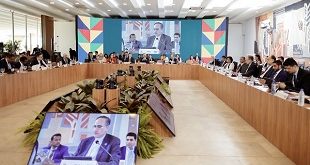
By Haggai Matsiko
Gaping illiteracy, poverty and ethnic tensions stand in the way of participatory governance
Along the dusty roads of Kaluguuza, a small town in Kibaale district, western Uganda, Moses Kahwa, a local shopkeeper, passionately debates the upcoming elections with other local self-proclaimed political analysts.
Baguma cannot win Matia, says Kahwa, referring to the upcoming parliamentary election between the incumbent Matia Kasaija, who is also the minister of State for Internal Affails and Baguma Isoke, a former area MP and minister in the central government.
We have already decided whom to vote for,says another participant. And it is those that have worked for us.
As the debate rages, it is unlikely for one not to notice the Omnipresence of the National Resistance Movement (NRM). The town is all dotted with yellow posters .

People here know only NRM,says Kenneth Akugizibwe a secondary teacher. The other parties are there but very scarce and people are not aware about them.
Many residents in Kaluguuza espouse political opinions, but as a result of high poverty, illiteracy and ethnic tensions, these views are often skewed and true participatory governance remains a dream beyond reach.
The people are poor and they often prefer to fill their bellies for the day other than wait for the politicians promises, which of course denies them better service provision,†says Mataale sub- county chairman Charles Ssenyonga, referring to the 630,000 people who live in the district.
However, George Bizibu, a councilor for Mataale sub-county says the problem is that people have monetised politics. He says that when the leaders come back for meetings, the residents ask them for money to buy sodas and paraffin. Consequently, sentisation programs offered by Action Aid, World Voices Uganda and other NGOs that could improve political accountability remains a big challenge considering people only turn up when they know there are freebies.
For the past nine months, ActionAid has worked in Bunyoro on activities to arm citizens with knowledge, skills and attitudes that can help them become active participants in the local decision making processes and influence democratic processes as part of the nationwide project by Deepening Democracy Programme.
The activities have included civic education trainings, public debates on radio, and drama.
On July 21, ActionAid took journalists to Kibaale will look into the issues of citizens participation and responsibility in a democracy and measure how ready citizens in Kibale are for the 2011 election.
The journalists spoke with district leaders, opinion makers, and ordinary citizens to as assess how deep democracy is in Kibaale.
In the run-up to the elections, NRM has made efforts to tighten its already firm grip on the region. At a small meeting with district leaders, Nsambu John, the District Internal Security Officer (DISO) says that opposition parties are minor and that we cannot allow them to destabilise us when they want to stage their functions. They must seek permission.
Kibaale residents have also been affected by years of ethnic tensions between the indigenous Banyoro and the majority Bakiga who are immigrants. As a result of these tensions people prefer to vote their tribesmen and not competent leaders.
Although residents say that ethnic tensions is due to competition for natural resources, the thirst for political office seems to be a major cause of the tensions.
The district chairman, George Namyaka, a Munyoro, admits that he is a compromise candidate after being imposed on the electorate that had chosen a Mukiga.
Namyaka was appointed by President Yoweri Museveni at the helm of ethnic tensions between the Banyoro and Bakiga.
In order to contain the tribal based competition for political office, the government decided to create more counties and constituencies in order to increase the number of political offices for the two tribes.
The district was further divided into five constituencies; Buyaga East and Buyaga West, Bugangaizi West and Bugangaizi East, and Buyanja.
The district chair says that the governments hope is that as the two tribes get equal representation in electoral offices and intermarry, the tribal tensions will subdue.
However, critics say that this might be a recipe for intense divisions because the move is likely to polarise the district instead of uniting it. Moreover, tribe-based voting seems to continuously deny the electorate responsible leaders.
Indeed poor leadership and poor service delivery are largely evident in the district. Last year, Kibaale was among the worst performers. The district NAADs coordinator was recently arrested for embezzling funds.
 The Independent Uganda: You get the Truth we Pay the Price
The Independent Uganda: You get the Truth we Pay the Price



